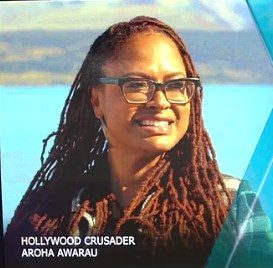Māori Crime Rate a Myth — Hollywood Director
Aroha Awarau, Maori Television, March 12, 2018
Hollywood director, Ava DuVernay, has weighed in on the high imprisonment rates for Māori — comparing their struggle to African-Americans.
DuVernay’s Oscar-nominated documentary, The 13th, addresses the injustice of mass incarceration in the US. In New Zealand to shoot parts of the Disney film A Wrinkle in Time, she was shocked to learn that Māori makes up 53 percent of the New Zealand prison population.
“Extraordinary numbers that very much matches the model that’s happening in the United States. We know there’s someone who’s Māori would be sentenced differently to someone who’s not. The idea that Māori people commit more crimes, not quite. The idea that white people commit fewer crimes, is ridiculous. It’s a myth, it’s a fabrication.”
She says the reason for the high statistics is because prisons need to make money.
“Brown people and people of colour need to educate ourselves and forward-thinking white people [should] educate themselves. Incarceration is a business. You think people would be locked away if nobody is making money out of it? There’s profit in prisons. Private prisons, the food in the prisons, the phone calls in the prisons, the clothes that they wear.”
DuVernay was in New Zealand with Oprah Winfrey and Reese Witherspoon last year to shoot A Wrinkle in Time. She feels a connection to New Zealand.
“This film is about conquering darkness with light. It’s about the forces of nature that kind of control us all. And what better place to be connected with that in New Zealand? It’s one of the last places on earth that I feel is truly connected to its sacred origins.”
Hollywood director, Ava DuVernay, has weighed in on the high imprisonment rates for Māori — comparing their struggle to African-Americans.
DuVernay’s Oscar-nominated documentary, The 13th, addresses the injustice of mass incarceration in the US. In New Zealand to shoot parts of the Disney film A Wrinkle in Time, she was shocked to learn that Māori makes up 53 percent of the New Zealand prison population.
“Extraordinary numbers that very much matches the model that’s happening in the United States. We know there’s someone who’s Māori would be sentenced differently to someone who’s not. The idea that Māori people commit more crimes, not quite. The idea that white people commit fewer crimes, is ridiculous. It’s a myth, it’s a fabrication.”
She says the reason for the high statistics is because prisons need to make money.
“Brown people and people of colour need to educate ourselves and forward-thinking white people [should] educate themselves. Incarceration is a business. You think people would be locked away if nobody is making money out of it? There’s profit in prisons. Private prisons, the food in the prisons, the phone calls in the prisons, the clothes that they wear.”
DuVernay was in New Zealand with Oprah Winfrey and Reese Witherspoon last year to shoot A Wrinkle in Time. She feels a connection to New Zealand.
“This film is about conquering darkness with light. It’s about the forces of nature that kind of control us all. And what better place to be connected with that in New Zealand? It’s one of the last places on earth that I feel is truly connected to its sacred origins.”
















